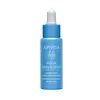What's inside
What's inside
 Key Ingredients
Key Ingredients

 Benefits
Benefits

 Concerns
Concerns

 Ingredients Side-by-side
Ingredients Side-by-side

Water
Skin ConditioningCitrus Limon Fruit Extract
MaskingGlycolic Acid
BufferingMethylpropanediol
SolventAlcohol Denat.
AntimicrobialSodium Hydroxide
BufferingDipropylene Glycol
HumectantSphingomonas Ferment Extract
Skin ConditioningCitrus Limon Peel Oil
MaskingSodium Hyaluronate
HumectantOzothamnus Diosmifolius Extract
Citrus Aurantium Dulcis Peel Oil
MaskingCitrus Aurantifolia Oil
CleansingRose Flower Oil
MaskingFortunella Margarita Peel Oil
Lavandula Angustifolia Oil
MaskingRosmarinus Officinalis Leaf Oil
MaskingAlthaea Rosea Flower Extract
Skin ConditioningCitrus Aurantium Bergamia Fruit Oil
Masking1,2-Hexanediol
Skin ConditioningOctyldodeceth-16
EmulsifyingPhosphorus Pentoxide
BufferingPanthenol
Skin ConditioningButylene Glycol
HumectantSalicylic Acid
MaskingAllantoin
Skin ConditioningPentylene Glycol
Skin ConditioningBeta-Glucan
Skin ConditioningCaprylyl Glycol
EmollientEthylhexylglycerin
Skin ConditioningPhenoxyethanol
PreservativeLimonene
PerfumingCitral
PerfumingWater, Citrus Limon Fruit Extract, Glycolic Acid, Methylpropanediol, Alcohol Denat., Sodium Hydroxide, Dipropylene Glycol, Sphingomonas Ferment Extract, Citrus Limon Peel Oil, Sodium Hyaluronate, Ozothamnus Diosmifolius Extract, Citrus Aurantium Dulcis Peel Oil, Citrus Aurantifolia Oil, Rose Flower Oil, Fortunella Margarita Peel Oil, Lavandula Angustifolia Oil, Rosmarinus Officinalis Leaf Oil, Althaea Rosea Flower Extract, Citrus Aurantium Bergamia Fruit Oil, 1,2-Hexanediol, Octyldodeceth-16, Phosphorus Pentoxide, Panthenol, Butylene Glycol, Salicylic Acid, Allantoin, Pentylene Glycol, Beta-Glucan, Caprylyl Glycol, Ethylhexylglycerin, Phenoxyethanol, Limonene, Citral
Water
Skin ConditioningCaprylic/Capric/Succinic Triglyceride
EmollientPropanediol
SolventInulin
Skin ConditioningMel
EmollientPropolis Extract
Skin ConditioningCistus Incanus Flower/Leaf/Stem Extract
Skin ConditioningIris Versicolor Extract
EmollientChlorella Vulgaris Extract
Skin ConditioningRosa Canina Fruit Extract
AstringentSodium Hyaluronate
HumectantAloe Barbadensis Leaf Juice Powder
Skin ConditioningHelianthus Annuus Seed Oil
EmollientRosa Damascena Flower Oil
MaskingAllantoin
Skin ConditioningTocopherol
AntioxidantFructose
HumectantSaccharide Hydrolysate
HumectantTocopheryl Acetate
AntioxidantGlycerin
HumectantPolyacrylate Crosspolymer-6
Emulsion StabilisingHydroxypropyl Cyclodextrin
MaskingLactic Acid
BufferingHydroxyacetophenone
AntioxidantEthylhexylglycerin
Skin ConditioningDisodium EDTA
Citronellyl Methylcrotonate
MaskingSodium Hydroxide
BufferingParfum
MaskingGeraniol
PerfumingCitronellol
PerfumingLinalool
PerfumingLimonene
PerfumingWater, Caprylic/Capric/Succinic Triglyceride, Propanediol, Inulin, Mel, Propolis Extract, Cistus Incanus Flower/Leaf/Stem Extract, Iris Versicolor Extract, Chlorella Vulgaris Extract, Rosa Canina Fruit Extract, Sodium Hyaluronate, Aloe Barbadensis Leaf Juice Powder, Helianthus Annuus Seed Oil, Rosa Damascena Flower Oil, Allantoin, Tocopherol, Fructose, Saccharide Hydrolysate, Tocopheryl Acetate, Glycerin, Polyacrylate Crosspolymer-6, Hydroxypropyl Cyclodextrin, Lactic Acid, Hydroxyacetophenone, Ethylhexylglycerin, Disodium EDTA, Citronellyl Methylcrotonate, Sodium Hydroxide, Parfum, Geraniol, Citronellol, Linalool, Limonene
Ingredients Explained
These ingredients are found in both products.
Ingredients higher up in an ingredient list are typically present in a larger amount.
Allantoin is a soothing ingredient known for its protective and moisturizingg properties. Because of this, it is often added to products with strong active ingredients.
Studies show higher concentrations of this ingredient can promote wound healing.
Though it can be derived from the comfrey plant, allantoin is produced synthetically for cosmetic products to ensure purity.
Learn more about AllantoinEthylhexylglycerin (we can't pronounce this either) is commonly used as a preservative and skin softener. It is derived from glyceryl.
You might see Ethylhexylglycerin often paired with other preservatives such as phenoxyethanol. Ethylhexylglycerin has been found to increase the effectiveness of these other preservatives.
Limonene is a fragrance that adds scent and taste to a formulation.
It's found in the peel oil of citrus fruits and other plants such as lavender and eucalyptus. The scent of limonene is generally described as "sweet citrus".
Limonene acts as an antioxidant, meaning it helps neutralize free radicals.
When exposed to air, oxidized limonene may sensitize the skin. Because of this, limonene is often avoided by people with sensitive skin.
The term 'fragrance' is not regulated in many countries. In many cases, it is up to the brand to define this term. For instance, many brands choose to label themselves as "fragrance-free" because they are not using synthetic fragrances. However, their products may still contain ingredients such as essential oils that are considered a fragrance.
Learn more about LimoneneSodium Hyaluronate is hyaluronic acid's salt form. It is commonly derived from the sodium salt of hyaluronic acid.
Like hyaluronic acid, it is great at holding water and acts as a humectant. This makes it a great skin hydrating ingredient.
Sodium Hyaluronate is naturally occurring in our bodies and is mostly found in eye fluid and joints.
These are some other common types of Hyaluronic Acid:
Learn more about Sodium HyaluronateSodium Hydroxide is also known as lye or caustic soda. It is used to adjust the pH of products; many ingredients require a specific pH to be effective.
In small amounts, sodium hydroxide is considered safe to use. However, large amounts may cause chemical burns due to its high alkaline.
Your skin has a natural pH and acid mantle. This acid mantle helps prevent harmful bacteria from breaking through. The acid mantle also helps keep your skin hydrated.
"Alkaline" refers to a high pH level. A low pH level would be considered acidic.
Learn more about Sodium HydroxideWater. It's the most common cosmetic ingredient of all. You'll usually see it at the top of ingredient lists, meaning that it makes up the largest part of the product.
So why is it so popular? Water most often acts as a solvent - this means that it helps dissolve other ingredients into the formulation.
You'll also recognize water as that liquid we all need to stay alive. If you see this, drink a glass of water. Stay hydrated!
Learn more about Water